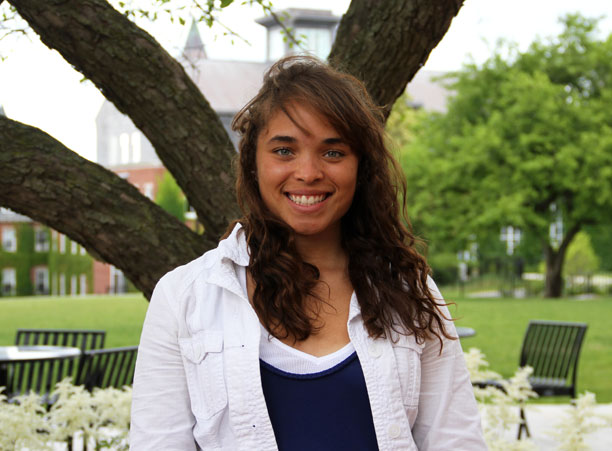Watch the nightly news and it seems like there is no shortage of global humanitarian disasters. The food crisis in the Horn of Africa. Homes splintered by devastating tornadoes in Joplin, Mo. Genocide and gender-based violence across refugee camps in Africa. Epic floods in the Philippines and Pakistan.
Finding a suitable response to global humanitarian issues, such as these, was the focus of the third biennial Jesuit Universities Humanitarian Action Network (JUHAN) student leadership conference this month.
From Santa Clara to Holy Cross, and Qatar to Beirut, more than 100 students, faculty, and professionals brought their minds and hearts to Fairfield University in Connecticut. Titled “Global Perspectives on Humanitarian Action,” the goal of the intensive three day conference was to gain deeper understanding of humanitarian advocacy through networking, training, and reflection.
In addition to myself, the Holy Cross delegation included Malik Neal ’13, Vivian Daly ’13, Nicholas Ricciardi ’13 and Caitlin Cantor ’15. We were accompanied by Diane Fox, visiting assistant professor of sociology, and Timothy R. Austin, vice president for academic affairs and dean of the College.
“One great and wonderful difference compared to other years was the expansion of JUHAN to include students and teachers from Jesuit colleges and universities around the world”, says Diane Fox. “As one of the students from Mexico put it ‘humanitarian' has a different meaning in Mexico. The exploration of such differences of experience and meanings is a great chance for our students to challenge and expand their understandings of the world we share.”
We were all eager to attend presentations on Sri Lankan child soldiers, Jesuits in social justice, genocide prevention, dilemmas in Somalia, India and development and more. The presenters represented diverse backgrounds, universities and humanitarian organizations such as Catholic Relief Services, International Rescue Committee and World Youth Alliance. Their inspiring stories created an environment where everyone could imagine themselves as “men and women for others.”
This year's conference was structured differently than previous ones. This time, students simulated actions of non-governmental organizations or international organizations. The ongoing crisis between tribes in South Sudan and Sudan was the central focus of one exercise. Each college delegation read articles on the subject and as an NGO or international organization had to create responses and requests for aid such as water, transportation, security, clothing, and medicine. This structure offered a tangible approach in critical thinking, collaboration, and communication skills — something students can put to action at their respective campuses.
“Holy Cross students are always quick to react to humanitarian crises,” says Austin. “In the past decade, we’ve stepped up in response to the 2004 Indian Ocean tsunami, to the 2010 Haiti earthquake, the Darfur genocide, and to many other crises around the world."
There has also been discussion about incorporating humanitarianism into the academic curriculum.
"A significant goal of JUHAN since its founding has been to provide courses, and perhaps even a concentration, in humanitarian action," he says. "The national organization seems closer to delivering on that promise and Holy Cross will need to evaluate how the academic content it designs fits with a liberal arts curriculum."
Expect this year’s participants to expand their newfound knowledge and relay the information they learned at JUHAN back to fellow Holy Cross students. There are many ways of doing this.
“Our JUHAN delegates can certainly help by working with recognized student organizations such as Pax Christi and Oxfam,” Austin says.
Other possible ideas include initiating student-faculty humanitarian research, coverage of humanitarian issues in the Crusader student paper, joining Eco-Action and World for Peace, or simply presenting photo exhibits on natural disasters. More advocacy generates more awareness. The hope is that the more we actively involve the campus, the more brain power we can get to solve complex humanitarian crises.
Maya Rock '13, of Sparta, N.J., is a sociology major with a concentration in Women's and Gender Studies.
Related Information:
- Read Vivian Daly's blog entry about JUHAN
- America Magazine, July 16: "Humanitarian Studies"


